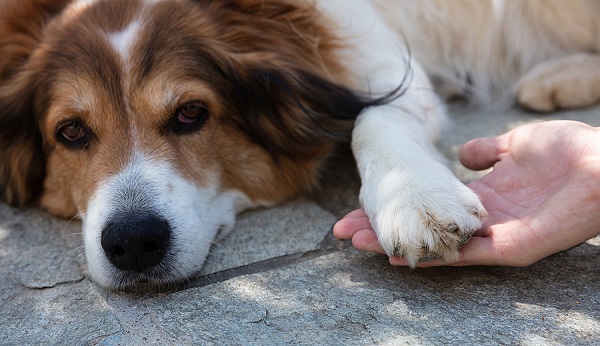More than 63 million households in America include dogs based on a recent survey, which makes dogs the most popular pets and companion animals in the country. Most dog parents find that their four-legged family members exhibit certain quirky behaviors. After all, each one has its own unique personality, and that can come with a range of odd habits. For many, though, those behaviors can turn into problematic obsessions. One of the most common of those actions is paw licking. Though all dogs lick their paws at times, this can be a sign of serious gastrointestinal disorders.

Looking at Common Canine Gastrointestinal Disorders
As is the case with people, dogs can experience their fair share of gastrointestinal disorders. These may be caused by foods, genetic predisposition, bacteria, parasites, and numerous other factors. Like many pet parents, though, you may be wondering why do dogs lick their paws as a result of those disorders. That question has a multifaceted answer that generally stems from the nature of the issues the dog is experiencing.
Lymphocytic-Plasmacytic Gastroenteritis
A form of inflammatory bowel disease that commonly affects dogs. With this condition, lymphocytes, or white blood cells, accumulate in the stomach and intestines. Plasma cells also gather in those areas. This condition is the result of an overactive immune system, but little is known about exactly what causes it to arise in dogs, cats, and humans.
When those cells gather in the digestive system, they cause inflammation that may lead to several symptoms, such as loss of appetite, diarrhea, and vomiting. Of course, it can also cause dogs to incessantly lick their paws. Inflammation from this condition tends to spread from the digestive tract to other areas of the body, one of which is the extremities. In turn, it causes itching and discomfort that leads dogs to chew and lick their paws to try to remedy it.
Foreign Bodies in the Intestines
Foreign bodies in the intestines are items dogs have eaten that they shouldn’t have, including toys, socks, or rocks among others. Since those items can’t be digested, they make their way into the digestive tract where they become lodged. There, they can lead to a range of symptoms, like pain, loss of appetite, vomiting, and diarrhea. As is the case with other GI problems, they can also prompt dogs to lick their paws more often than usual because of inflammation and infections caused by excessive amounts of bacteria surrounding the foreign objects.
Pancreatitis
Pancreatitis is another common reason dogs suddenly begin to obsessively lick their paws. With this condition, enzymes released by the pancreas become active too early in the digestive process and begin to damage the pancreas and other surrounding organs. Again, the paw licking often accompanying this condition comes from radiating inflammation and discomfort. Other symptoms of this condition may include weakness, fatigue, fever, vomiting, diarrhea, distended abdomen, and signs of discomfort or pain.
Taking Care of Your Dog’s Paw-Licking Problems
Incessant paw licking can lead to problems, such as sores, bleeding, swelling, and infections. In most cases, though, it’s a sign of deeper issues that should be addressed to ensure your dog’s overall health and comfort. With the previously mentioned conditions that are known to cause dogs to lick their paws, the best approach would be a visit to the vet because professional medical intervention is required to effectively remedy them.











